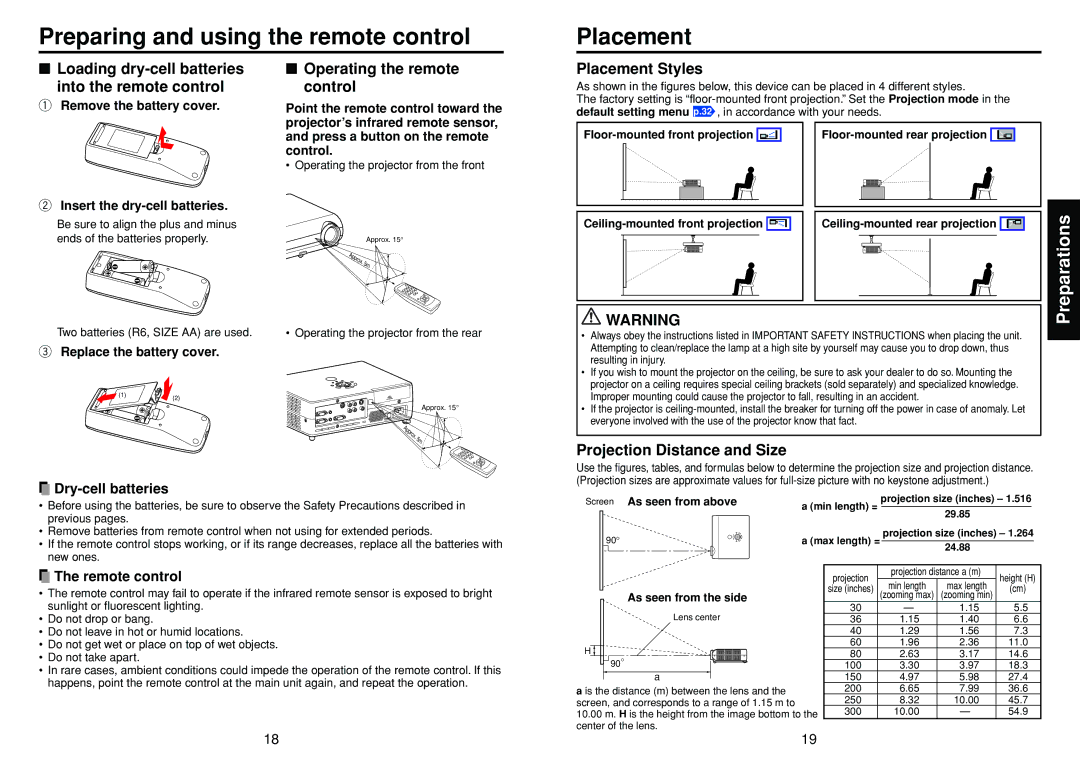
Preparing and using the remote control
Placement
■Loading dry-cell batteries
into the remote control
qRemove the battery cover.
■Operating the remote control
Point the remote control toward the projector’s infrared remote sensor, and press a button on the remote control.
• Operating the projector from the front
Placement Styles
As shown in the figures below, this device can be placed in 4 different styles.
The factory setting is
wInsert the dry-cell batteries.
Be sure to align the plus and minus |
|
ends of the batteries properly. | Approx. 15° |
| Approx. |
| 5m |
Two batteries (R6, SIZE AA) are used. | • Operating the projector from the rear | |
e Replace the battery cover. |
| |
(1) | (2) |
|
|
| |
|
| Approx. 15° |
|
| Approx. |
|
| 5m |

Dry-cell batteries
•Before using the batteries, be sure to observe the Safety Precautions described in previous pages.
•Remove batteries from remote control when not using for extended periods.
•If the remote control stops working, or if its range decreases, replace all the batteries with new ones.
![]() The remote control
The remote control
•The remote control may fail to operate if the infrared remote sensor is exposed to bright sunlight or fluorescent lighting.
•Do not drop or bang.
•Do not leave in hot or humid locations.
•Do not get wet or place on top of wet objects.
•Do not take apart.
•In rare cases, ambient conditions could impede the operation of the remote control. If this happens, point the remote control at the main unit again, and repeat the operation.
|
| Preparations | ||||||||||||
|
|
| ||||||||||||
|
|
|
|
|
|
|
|
|
|
|
|
|
|
|
|
|
|
|
|
|
|
|
|
|
|
|
|
|
|
|
|
|
|
|
|
|
|
|
|
|
|
|
|
|
|
|
|
|
|
|
|
|
|
|
|
|
|
|
|
|
|
|
|
|
|
|
|
|
|
|
|
|
|
|
|
|
|
|
|
|
|
|
|
|
|
|
|
|
|
![]() WARNING
WARNING
•Always obey the instructions listed in IMPORTANT SAFETY INSTRUCTIONS when placing the unit. Attempting to clean/replace the lamp at a high site by yourself may cause you to drop down, thus resulting in injury.
•If you wish to mount the projector on the ceiling, be sure to ask your dealer to do so. Mounting the projector on a ceiling requires special ceiling brackets (sold separately) and specialized knowledge. Improper mounting could cause the projector to fall, resulting in an accident.
•If the projector is
Projection Distance and Size
Use the figures, tables, and formulas below to determine the projection size and projection distance. (Projection sizes are approximate values for
Screen As seen from above | a (min length) = | projection size (inches) – 1.516 | |||
|
| 29.85 |
| ||
|
|
|
|
| |
90° | a (max length) = | projection size (inches) – 1.264 | |||
| 24.88 |
| |||
|
|
|
|
| |
|
| projection | projection distance a (m) | height (H) | |
|
| min length | max length | ||
|
| size (inches) | (cm) | ||
As seen from the side |
| (zooming max) | (zooming min) | ||
Lens center |
| 30 | — | 1.15 | 5.5 |
| 36 | 1.15 | 1.40 | 6.6 | |
|
| 40 | 1.29 | 1.56 | 7.3 |
H |
| 60 | 1.96 | 2.36 | 11.0 |
| 80 | 2.63 | 3.17 | 14.6 | |
90° |
| 100 | 3.30 | 3.97 | 18.3 |
a |
| 150 | 4.97 | 5.98 | 27.4 |
a is the distance (m) between the lens and the |
| 200 | 6.65 | 7.99 | 36.6 |
screen, and corresponds to a range of 1.15 m to |
| 250 | 8.32 | 10.00 | 45.7 |
10.00 m. H is the height from the image bottom to the | 300 | 10.00 | — | 54.9 | |
center of the lens.
18 | 19 |
